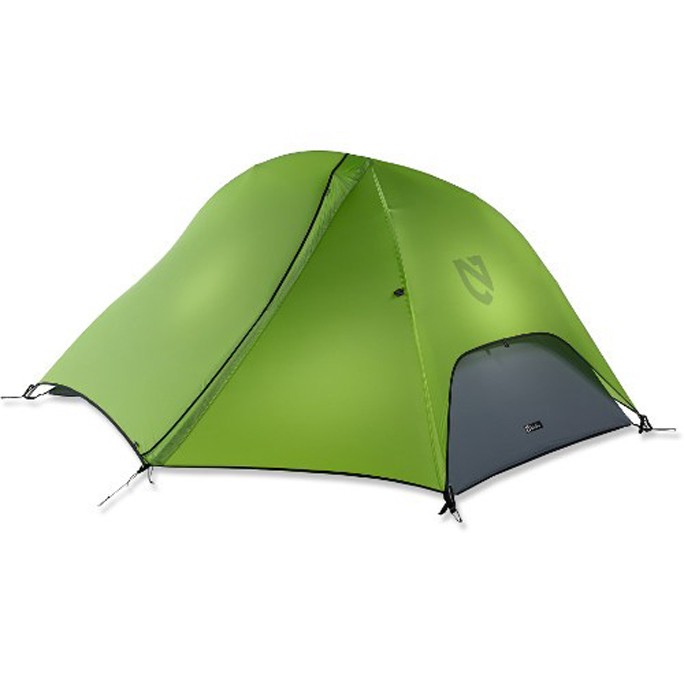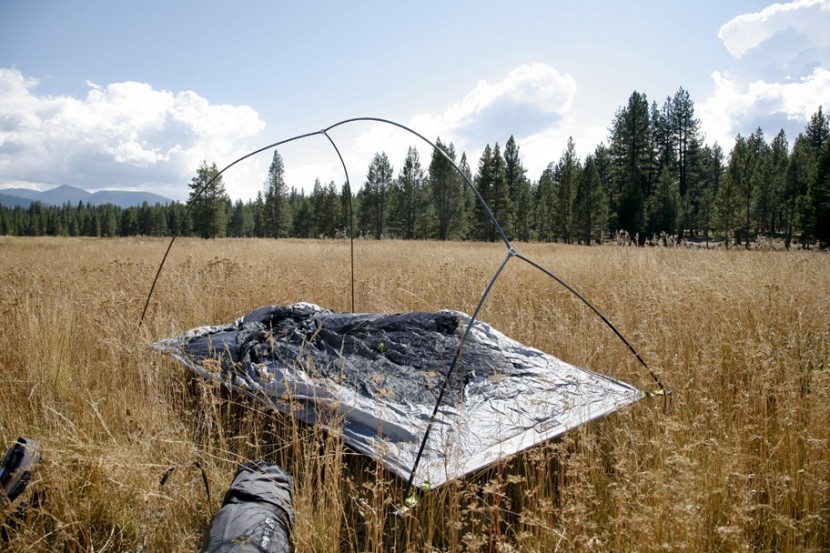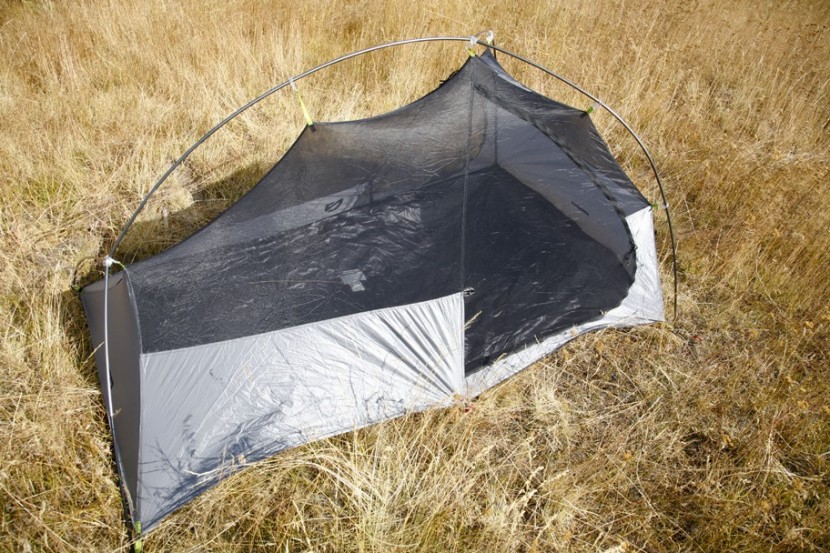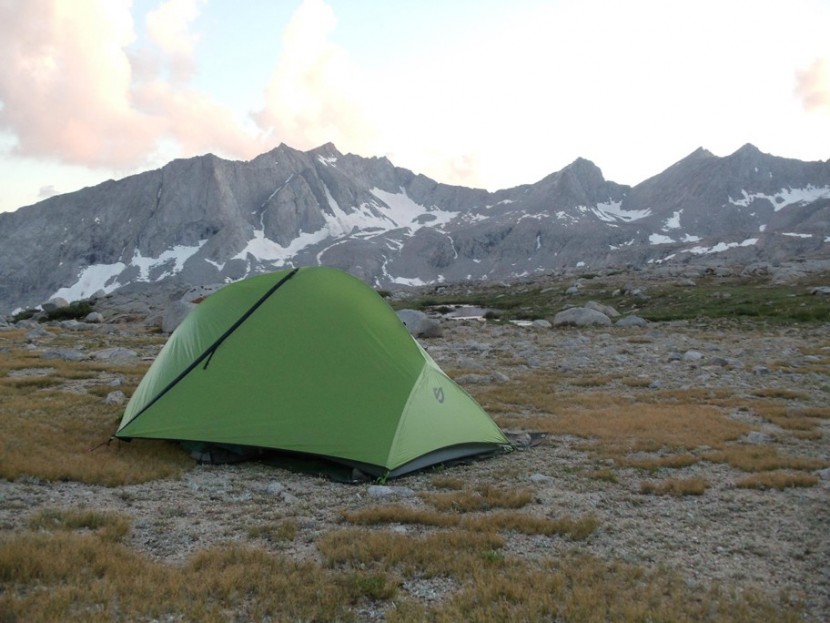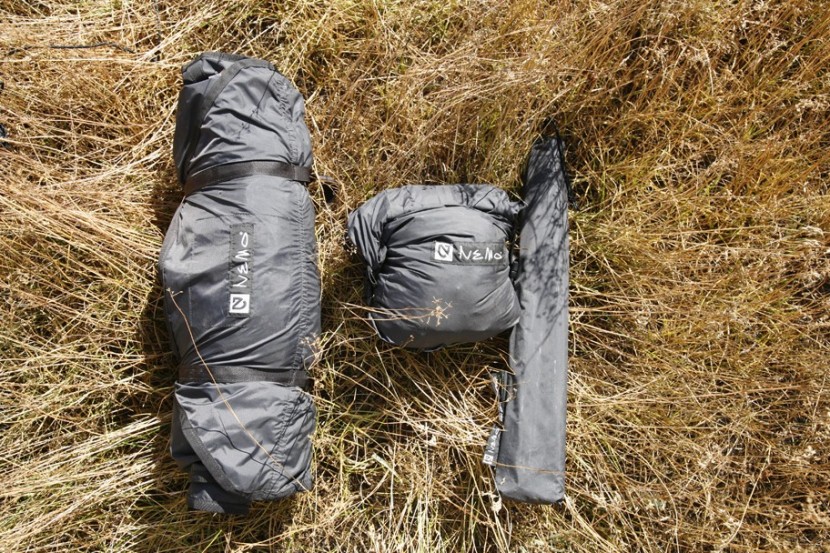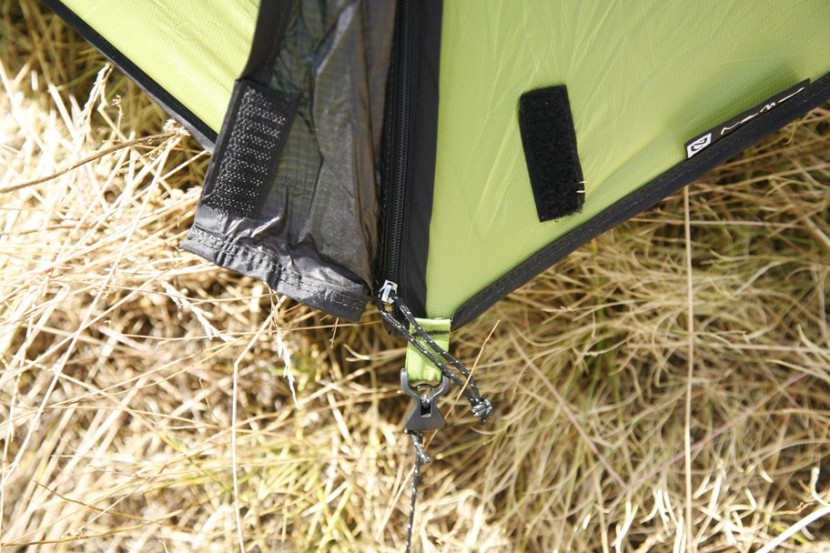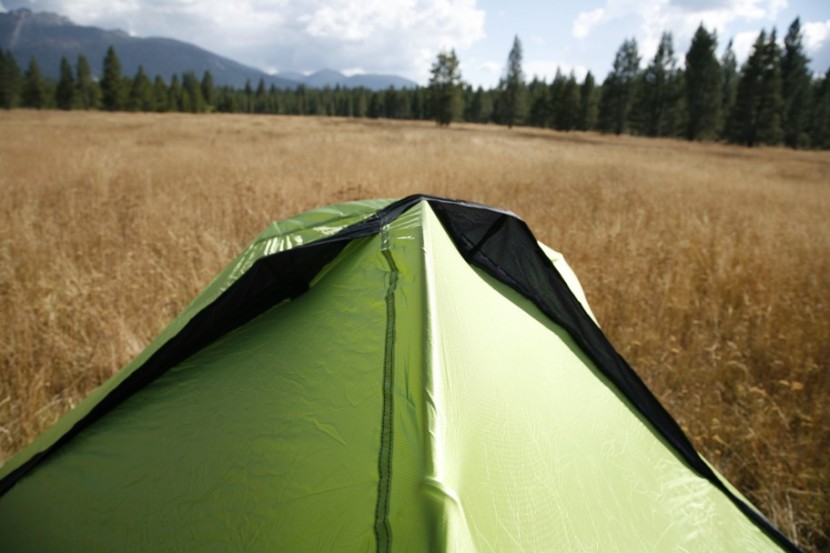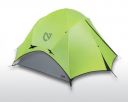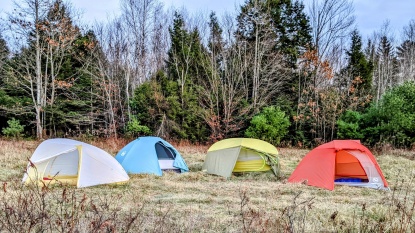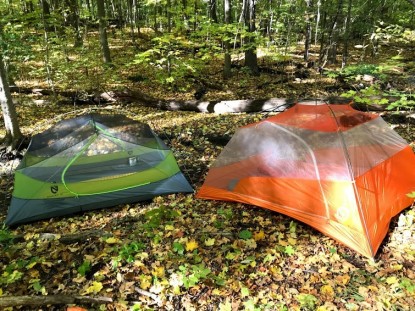At 3 lb. 9 oz. the Nemo Obi 2 is the lightest two-door double wall tent we've tested. It saves weight with a small inner tent that's cozy for two people and by using a single waterproof wall at the ends. Our testers appreciated the Obi's two vestibules but found the tent to be among the least comfortable we've tested for those approaching or over six feet tall. It is able to be “fast pitched”.
See how the Obi compares to other tents in our Best Backpacking Tent Review.Nemo Obi 2 Review
Our Verdict
Our Analysis and Test Results
Livability
The Obi's two door design makes backcountry travel with a double wall tent more comfortable than single front entrance tents. Being able to enter and exit through your own door is less disruptive to your adventure partner than single entrance tents. It's also nicer to have your own vestibule space. The Obi's 40" peak height lets you sit up in the front and the pole design provides slightly more support than tents with three ground level pole connections.
Nemo lists the Obi's width as 50 in., which we measured as the width of the front exterior. The interior width is 48 in. at the widest point, 42 in. at the shoulder area, and 40 in. at the foot. There's enough space inside for two 20 in. wide pads with a couple of inches to spare on the sides at by the front of the tent and on extra space at the foot. Our testers' most significant complaint with the Obi was its length. The interior measures 80 in. from the center front to the center rear. This wouldn't be too bad except the bottom front of the tent is made with a single waterproof fabric that's prone to condensation. One of our 5 ft. 8 in. tall testers said that she wouldn't want to be one inch taller. In a lofted sleeping bag the author, at 6 ft. 1 in. tall, touches both ends simultaneously, which forces him to curl up in order to not get wet in the rain.
The Obi's two vestibules are roughly as small as many other lightweight tents and provide enough space to cover a pair of shoes and a small pack. One side pocket and ceiling pocket make it easier to find a headlamp at night. Clips attach the inner tent to the outer tent to increase interior volume. The two small vents at the top of the door may help slightly to combat condensation.
Weather Resistance
The Obi's double wall construction provides protection from all of the elements. As mentioned above, the shorter interior length and single wall ends make it relatively easy to get the bottom of a sleeping bag wet when it's raining. The Obi has wonderfully high waterproof side walls everywhere except on the doors. But splashback doesn't discriminate. One tester reported that in heavy rain on compact soil dirty splashback hit the mesh door and water seeped into the tent. Expanding the waterproof wall to include the bottom of the door could help to address this problem.
The Obi's thin low profile design helps it to shed wind. Our testers pitched the Obi and Losi side-by-side in a fierce High Sierra thunderstorm that blew the larger Losi away. The Obi's small size is a considerable advantage in serious three-season storms. Two other female testers (5' 5" and 5' 7" tall) hiked the length of the John Muir trail with the Obi and found that the tent held up well to the winds and one thunderstorm on their trip.
Weight and Packed Size
The Obi weighs just under 57 oz., or 3 lb. 9 oz., with stakes. In comparison, the lightest double wall tent tested weighs 24 ounces or 42 percent less than the Obi. The Obi comes with an alpine style stuff sack that separates the inner and outer tents from the pole, a design that we see more often with four-season single wall tents like the Mountain Hardwear Direkt2 and Black Diamond Firstlight. It's very good at compressing the tent body. Some companies such as Hilleberg and Warmlite argue that tents last longer when rolled up around the poles, but, as far as we know, there's little evidence to support that theory.
Limitations
The Obi lacks a clip at the vestibule door. Adding one would help to relieve stress on the vestibule zipper. We don't believe that the Obi's use of DAC Jake's Feet on the four corners results in a net benefit. These are slightly easier to use but not as reliable as traditional grommets. See the photos below for details. It's also important to note that Nemo is the only company that we know of that allows you to swap out the bottom part of the Jake's Feet. This could be useful if one was to break, but we still prefer grommets.
The clip that connects the inner tent to the outer tent lies high up on the inner tent wall (at the corner of the waterproof fabric and mesh). In high winds we found that this reduces tension on the inner wall and can make it flap around violently in the wind and smack you in the face if you're daring to go close enough. Other tents that have the same feature put the clip lower on the wall, which we prefer.
There's only one Velcro closure to connect the fly to the inner tent. Adding many more would greatly increase the Obi's strength in high winds because the outer tent needs to connect to the poles. The strongest tents tested here use continuous sleeves to connect the poles to either the inner or outer tent. Adding more closures, would make the system stronger. Nemo uses lots of excellent closures on its Tenshi tent (a bomber single wall shelter winter climbing). Using the same closures on the Obi would further increase its ability to handle three-season storms.
Best Application
Lightweight backpacking with people that are around or less than 5' 8" tall.
Value
The Obi is one of the most expensive tents tested in this category. We plot retail prices and our scores for each tent in a Price versus Value Chart.
Other Versions
Obi Elite 1
- Cost - $419
- Single person version
- Trail weight - 2 lbs 7 oz
- Floor area - 21 sq ft
- Peak height - 40 in
Nemo Losi 2
- Cost - $320
- Weight - 5 lbs 12 oz
- Floor area - 32 sq ft
- A wonderfully spacious tent for three-season adventures
- Features steep walls and a tall peak height (46 in)
Accessories
Nemo Obi 2 Footprint
- Cost - $40
- Weight - 8.6 oz
- Adds longevity to your tent


